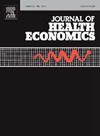不精确的健康信念和健康行为
IF 3.6
2区 经济学
Q1 ECONOMICS
引用次数: 0
摘要
本文研究了COVID-19背景下的信念不准确性,当时对健康结果的不确定性普遍存在。我们在大流行开始几个月后对年轻人样本进行了调查。我们推导出个体对不同健康结果的最小和最大主观概率,并将信念不精确定义为这些值之间的范围。我们记录了受访者不精确程度的实质性异质性,这在很大程度上仍无法解释标准人口统计学特征。为了评估不精确信念对行为的影响,我们询问了在具有不同保护行为水平的假设情景下对未来结果的信念。我们发现,那些期望保护行为不仅能减少负面健康结果的主观概率,还能减少与之相关的不精确程度的人,会表现得更有保护意识。本文章由计算机程序翻译,如有差异,请以英文原文为准。
Imprecise health beliefs and health behavior
This paper examines belief imprecision in the context of COVID-19, when uncertainty about health outcomes was widespread. We survey a sample of young adults a few months after the onset of the pandemic. We elicit individuals’ minimum and maximum subjective probabilities of different health outcomes, and define belief imprecision as the range between these values. We document substantial heterogeneity in the degree of imprecision across respondents, which remains largely unexplained by standard demographic characteristics. To assess the behavioral impact of imprecise beliefs, we ask beliefs about future outcomes under hypothetical scenarios that feature different levels of protective behaviors. We find that individuals who expect protective behaviors to reduce not only the subjective probability of a negative health outcome, but also the degree of imprecision associated with it, behave more protectively.
求助全文
通过发布文献求助,成功后即可免费获取论文全文。
去求助
来源期刊

Journal of Health Economics
医学-卫生保健
CiteScore
6.10
自引率
2.90%
发文量
96
审稿时长
49 days
期刊介绍:
This journal seeks articles related to the economics of health and medical care. Its scope will include the following topics:
Production and supply of health services;
Demand and utilization of health services;
Financing of health services;
Determinants of health, including investments in health and risky health behaviors;
Economic consequences of ill-health;
Behavioral models of demanders, suppliers and other health care agencies;
Evaluation of policy interventions that yield economic insights;
Efficiency and distributional aspects of health policy;
and such other topics as the Editors may deem appropriate.
 求助内容:
求助内容: 应助结果提醒方式:
应助结果提醒方式:


